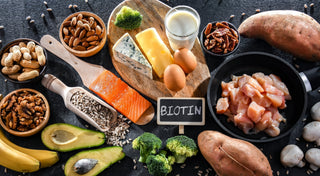Vitamin C is more than just an immune booster, it’s a vital nutrient that plays a key role in supporting a healthy pregnancy. From aiding tissue repair to enhancing iron absorption, this powerful antioxidant helps both mother and baby thrive. If you're exploring ways to optimise your prenatal nutrition, check out Supplement Hub’s Vitamin C collection for high-quality options tailored to your needs.
Among the recommended pregnancy supplements, vitamin C stands out for its versatility and impact. It works alongside other essential nutrients like folic acid, iron, and DHA to support foetal development and maternal health. Discover the full range of expertly curated prenatal and pregnancy supplements designed to guide you through every stage of your journey.
Vitamin C supports the pregnant body in plenty of important areas, from development and tissue repair, to immunity support.
-
Tissue Growth & Repair:
Vitamin C is crucial for synthesising collagen, which supports the development of your baby’s skin, bones, and connective tissues. It also helps repair maternal tissues that undergo rapid changes during pregnancy.
-
Immune Function:
Pregnancy can temporarily suppress the immune system, making you more susceptible to infections. Vitamin C helps bolster your defences, keeping both you and your baby protected. -
Iron Absorption: Iron is essential for producing red blood cells and preventing fatigue. Vitamin C enhances iron uptake from plant-based sources, making it especially valuable for vegetarians and vegans.
-
Antioxidant Protection: As a potent antioxidant, vitamin C neutralises free radicals that can cause cellular damage. This is particularly important during pregnancy, when oxidative stress may increase.
-
Gum & Skin Health: Hormonal changes can affect gum health and skin elasticity. Vitamin C helps maintain healthy gums and supports skin regeneration, reducing the risk of bleeding gums and stretch marks.
To learn when to begin taking vitamin C and other pregnancy supplements, explore Supplement Hub’s Trimester-by-Trimester Guide to Supplements and Fertility. It’s packed with expert advice to help you make informed choices at every stage, from pre-conception to postpartum.
Taking Vitamin C When Pregnant
During pregnancy, your nutritional choices are more important than ever and vitamin C is a powerful ally for both you and your growing baby. Known for its immune-boosting and antioxidant properties, this essential vitamin plays a multifaceted role in supporting development, wellbeing, and long-term health. Below is a breakdown of the key benefits vitamin C offers to expectant mothers and their babies during pregnancy.
| Benefit Area | Support for Mother | Support for Baby |
| Immune Health | Strengthens immunity, helping fight off infections | Enhances immune system development |
| Iron Absorption | Improves iron uptake, reducing risk of anaemia | Helps maintain proper oxygen supply through maternal iron |
| Tissue Growth & Repair | Promotes skin and tissue healing | Aids in formation of collagen, critical for bones & skin |
| Antioxidant Protection | Reduces oxidative stress | Protects developing cells from damage |
| Oral Health | Supports gum health and reduces inflammation | Encourages healthy tissue development |
| Energy Support | Contributes to fatigue reduction through iron synergy | Sustains healthy growth via enhanced nutrient absorption |
Is Vitamin C Safe During Pregnancy?
Vitamin C is not only safe during pregnancy, it’s widely recommended as part of a balanced prenatal nutrition plan. This essential nutrient plays a critical role in foetal development, maternal immunity, and iron absorption.
How Much Vitamin C Should I Take when Pregnant?
Vitamin C is a powerhouse nutrient during pregnancy, supporting everything from tissue growth and immune function to iron absorption and antioxidant protection. But how much is enough, and how much is too much? Let’s break it down.
In the UK, the recommended daily intake of vitamin C for pregnant women is 85 mg per day. This amount is considered sufficient to support maternal health and foetal development when combined with a balanced diet rich in fruits and vegetables.
Most prenatal vitamins include vitamin C, but if you're considering an additional supplement:
- Avoid exceeding 2000 mg per day, which is the tolerable upper intake level for adults.
- Excessive intake may lead to side effects like stomach upset, kidney stones, or insomnia.
Types of Vitamin C for Pregnancy
Vitamin C is a component often found in prenatal vitamins, where one dose provides a combination of all the necessary vitamins both mother and baby need. However, some people prefer to take each supplement individually, preferring things like oils, drops and beverages to tablets. Let’s explore the different types of vitamin C available, how they’re taken, and their unique benefits.
| Type of Vitamin C | Format | Benefits | Notes |
| Ascorbic Acid | Tablets, capsules, powders | Most common and affordable form | May cause stomach upset in high doses |
| Sodium Ascorbate | Powders, capsules | Gentler on the stomach, buffered | Suitable for those with acid sensitivity |
| Calcium Ascorbate | Tablets, powders | Adds calcium, less acidic | Often found in “buffered” C blends |
| Liposomal Vitamin C | Liquids, gels | Enhanced absorption via fat-soluble delivery | Ideal for those with absorption issues |
| Vitamin C from Whole Food Sources | Capsules, powders | Derived from acerola cherry, camu camu, etc. | May include additional phytonutrients |
| Vitamin C Drops or Sprays | Liquids | Easy to take, fast absorption | Great for those who dislike pills |
| Effervescent Tablets / Beverages | Fizzy drinks | Hydrating and tasty | Watch for added sugars or sweeteners |
If you're considering a standalone vitamin C product, look for pregnancy-safe labelling and ensuring no added artificial sweeteners or preservatives are added.
While vitamin C is generally safe, every pregnancy is unique. Before starting any new supplement, especially if you're combining formats or adjusting dosage, consult your healthcare professional or midwife.
Symptoms of Low Vitamin C during Pregnancy
What happens when levels fall short? Let’s explore the signs of deficiency, how they affect expectant mothers, and why maintaining balance is essential for both mum and baby. Low vitamin C can manifest in subtle ways, especially during pregnancy when the body’s nutritional demands are heightened. Symptoms may include:
- Fatigue and Weakness: Vitamin C helps convert fat into energy. A deficiency can leave you feeling unusually tired or sluggish.
- Frequent Infections: A weakened immune system may lead to more colds, flu, or other infections.
- Bleeding or Swollen Gums: Vitamin C supports gum health. Deficiency can cause inflammation or bleeding.
- Slow Wound Healing: Collagen production is impaired, making cuts and scrapes take longer to heal.
- Dry Skin and Hair: Poor collagen synthesis can affect skin elasticity and hair strength.
-
Easy Bruising: Fragile blood vessels may lead to bruises from minor bumps.
Joint Pain: Collagen is essential for healthy joints; deficiency may cause discomfort.
If left untreated, low vitamin C can lead to more severe issues:
- Iron-Deficiency Anaemia: Vitamin C enhances iron absorption. Without it, anaemia may develop, causing pale skin, dizziness, and breathlessness.
- Scurvy: Rare but serious, scurvy results from prolonged deficiency and includes symptoms like joint pain, gum disease, and skin problems.
- Impaired Foetal Development: Vitamin C supports the baby’s bones, skin, and connective tissues. Deficiency may hinder proper growth.
-
Increased Risk of Pre-eclampsia and Infections: A weakened immune system and poor vascular health can raise the risk of pregnancy complications
Vitamin C and Other Supplements
During pregnancy, your body is working overtime to support two lives. Vitamin C is just one piece of the puzzle, but it’s crucial for:
- Supporting maternal health: Preventing fatigue, infections, and anaemia.
- Promoting foetal development: Ensuring healthy tissue formation and growth.
-
Enhancing nutrient absorption: Especially iron, which is vital during pregnancy.
Let’s explore how vitamin C interacts with complementary nutrients and why an all-in-one prenatal supplement can be a smart choice.
| Nutrient | How It Works with Vitamin C | Benefits During Pregnancy |
| Iron | Vitamin C enhances iron absorption from plant-based sources | Helps prevent anaemia and supports oxygen delivery to baby |
| Vitamin E | Works together as antioxidants to protect cells | May reduce risk of placental issues and support skin health |
| Folic Acid (Vitamin B9) | Vitamin C helps maintain folate levels and supports its function | Crucial for neural tube development and preventing birth defects |
| Vitamin D | Supports immune function alongside vitamin C | Promotes bone health and regulates calcium levels |
| Zinc | Vitamin C may improve zinc absorption and immune response | Supports foetal growth and reduces risk of complications |
| Calcium | Vitamin C aids in collagen formation, which supports bone structure | Essential for baby’s skeletal development |
| B Vitamins (B6, B12) | Work with vitamin C in energy metabolism and red blood cell formation | Help reduce fatigue and support brain development |
An all-in-one prenatal supplement offers:
- Convenience: One tablet, once a day
- Balance: Nutrients in optimal ratios for absorption
-
Safety: Formulated specifically for pregnancy needs
Taking individual supplements without guidance can lead to:
- Overlapping doses (e.g. too much iron or vitamin A)
- Poor absorption due to missing cofactors
- Increased risk of side effects or interactions
Supporting your Body with Supplement Hub
Supplement Hub is a trusted provider of high-quality nutritional supplements, offering a comprehensive range of vitamins, minerals and other essential nutrients to support a healthy lifestyle. Whether you're preparing for pregnancy, supporting a growing baby, or simply looking to improve your overall wellness, we offer targeted solutions across a wide range of categories and Supplement Hub ensures that you get practitioner-approved products.
We always recommend consulting with a healthcare professional before selecting the right supplements for you. They’ll help you choose the right format and dosage based on your diet, health status and pregnancy stage.




